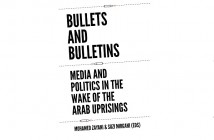
By Hassan Benmehdi, Source: Magharebia
Morocco’s first annual report on press freedom highlighted the progress that the country has made in the last year.
Communications Minister Mustapha El Khalfi said that 2012 was characterised by an attitude in the courts that encouraged reconciliation in cases involving journalists, and the creation of a system of sanctions that does not threaten the economic structure of press establishments.
The February 23rd document did not mention any physical or moral attack on Moroccan journalists.
The report also claimed that no publication was banned or censored during the past year, and no journalist was sent to prison.
The general trend is towards reconciliation between freedom of expression and respect for rules of ethics and responsibility, Justice Minister Mustapha Ramid told Magharebia.
The report said that last year was notable for the introduction of legal arrangements to safeguard the right of journalists to access and publish information.
It also noted the efforts to improve working conditions for journalists. It mentioned an agreement between the communications ministry and the Moroccan National Press Union (SNPM) concerning the introduction of a joint mechanism on the protection of journalists.
The report contained scientific indicators and the findings of the document were based on the announced reforms, Moroccan Federation of Newspaper Publishers (FMEJ) chair Noureddine Miftah said.
“As professionals, we think the main results of this report depend on what is achieved in projects currently under way,” Miftah added.
The communications department is currently working in conjunction with those in the industry to put the finishing touches to a legal framework governing the press and publishing.
The current reforms to the legal structure of the press sector led to the drafting of four bills, namely the Press Code, the Professional Journalism Code, the Higher Press Council Code and the Electronic Press Code, which will go together to make the Press and Publishing Code.
Political analyst Badr Laâmini noted that the 2011 constitution marked a new age for civil liberties with clear arrangements worthy of the most prestigious democracies.
“The work is still dominated by the thorny relationship between the courts and the press, and the balance between press freedoms and the right of access to information, hence the need to re-examine the legal arrangements and mechanisms covering them so that they can be brought into line with international standards,” he added.
“This doesn’t mean that aggrieved citizens don’t have the right to sue for defamation.” Such is the law-based state that the current government is creating in terms of freedom of expression, he said.
Some journalists are still dissatisfied.
Adil Lebbal wants to see the government ensure that the sector is organised, as “there are an increasing number of fake journalists who are entering the profession and giving it a bad image”.
Moroccan journalists are under huge pressures coming from different directions, columnist Nadia Jamilli said.
“The freedom of the press is very relative and the independence of journalists is most often trumped by the interests of political and economic decision-makers,” Jamili added.




